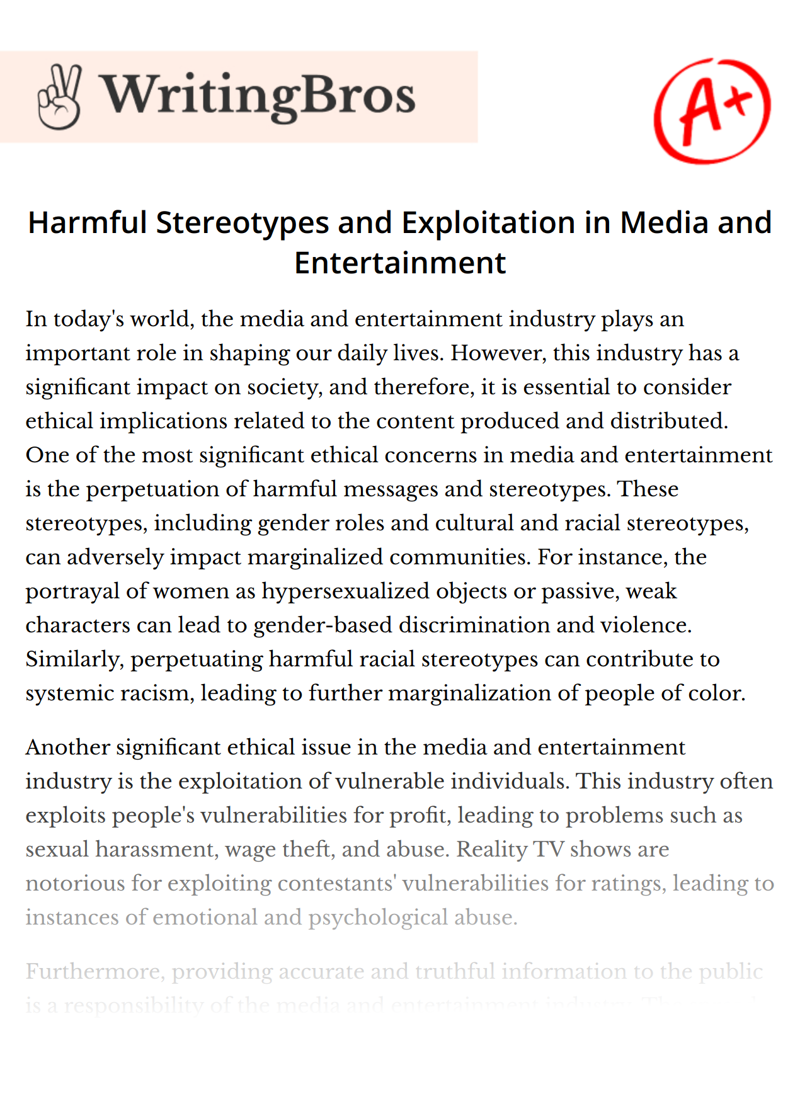Harmful Stereotypes and Exploitation in Media and Entertainment

In today's world, the media and entertainment industry plays an important role in shaping our daily lives. However, this industry has a significant impact on society, and therefore, it is essential to consider ethical implications related to the content produced and distributed. One of the most significant ethical concerns in media and entertainment is the perpetuation of harmful messages and stereotypes. These stereotypes, including gender roles and cultural and racial stereotypes, can adversely impact marginalized communities. For instance, the portrayal of women as hypersexualized objects or passive, weak characters can lead to gender-based discrimination and violence. Similarly, perpetuating harmful racial stereotypes can contribute to systemic racism, leading to further marginalization of people of color.
Another significant ethical issue in the media and entertainment industry is the exploitation of vulnerable individuals. This industry often exploits people's vulnerabilities for profit, leading to problems such as sexual harassment, wage theft, and abuse. Reality TV shows are notorious for exploiting contestants' vulnerabilities for ratings, leading to instances of emotional and psychological abuse.
Furthermore, providing accurate and truthful information to the public is a responsibility of the media and entertainment industry. The spread of fake news has become a significant ethical issue, causing confusion and misinformation among the public. False information dissemination can have severe consequences, including influencing elections and fueling public panic and anxiety.
To address ethical issues in media and entertainment, a multifaceted approach is necessary. It is vital to recognize these concerns and work towards creating an ethical and responsible media and entertainment industry. Both media professionals and consumers have a responsibility to demand and create content that is inclusive, respectful, and truthful. By making ethical decisions, we can create a more equitable society where media and entertainment can be utilized as a tool for positive change.
It is also essential to note that ethical issues in media and entertainment extend beyond the content produced and distributed. The industry's hiring practices and diversity are also ethical concerns. The lack of representation of women, people of color, and other marginalized communities in the industry can contribute to the perpetuation of harmful stereotypes and messages. The industry needs to prioritize diversity and inclusivity in hiring and decision-making to ensure that ethical concerns are addressed at all levels.
In conclusion, the media and entertainment industry holds immense power over our lives, and with that power comes the responsibility to consider ethical issues related to the content produced and distributed. Addressing ethical issues in media and entertainment requires a collective effort from all stakeholders involved. By recognizing these issues and taking steps to address them, we can create a more equitable and responsible media and entertainment industry that serves as a tool for positive change. It is time to prioritize ethical decision-making and create a media landscape that reflects the values of a just and inclusive society.
Cite this Essay
To export a reference to this article please select a referencing style below

